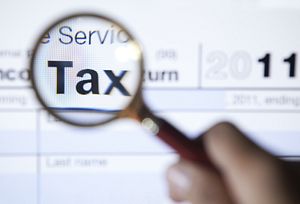Feeling overtaxed? If you are living in the OECD, then unfortunately you are not alone, although Asia’s citizens have less of a burden than others.
According to the latest data released by the Paris-based economic grouping, tax revenues have bounced back from their global financial crisis lows to reach an average ratio of 34.6 percent of gross domestic product (GDP) across its membership in 2012, up from 33.8 percent in 2010.
The ratio increased in 21 of the 30 countries surveyed, including in South Korea and New Zealand, with the Kiwis topping the Asia-Pacific average at a tax to GDP level of 32.9 percent.
Somewhat unsurprisingly, the crisis-hit eurozone economies of Hungary, Greece and Italy posted some of the largest tax hikes in 2012. Europe continued its dominance in the taxation stakes, led by Denmark (48 percent), Belgium and France (both 45.3 percent), reflecting their traditionally extensive social welfare policies.
By contrast, the Asia-Pacific contained generally lower tax takes, including Japan’s 28.6 percent and Australia’s 26.5 percent (both the latest 2011 data) and South Korea’s 26.8 percent. China’s has been estimated at 17 percent, compared to around 14 percent in both Hong Kong and Singapore, according to the Heritage Foundation.
The OECD blamed the continuing trend toward higher government revenues on a range of factors, including deliberate fiscal measures as well as the effects of rising income levels on countries with progressive tax systems, such as Australia.
Notably though, the average tax take across the OECD remains below its 2007 peak of 35 percent, indicating that governments have found it difficult to hike taxes following the world’s biggest economic downturn in decades.
However, the prospects of lower taxes appear limited, particularly in developed nations struggling to cope with rising health and pension costs caused by their aging societies.
Aging Asia to Pay
Japan has announced a record 95.9 trillion yen ($921 billion) budget for fiscal 2014 starting April 1, of which 43 percent will be funded by government bonds, adding to its growing debt-servicing costs.
Although currently among the lower rank of OECD nations in its tax take, April’s move to hike the consumption tax rate to 8 percent and subsequently to 10 percent in 2015 will increase the overall burden on its citizens, with fewer workers facing the prospect of increasing tax bills to fund their seniors.
According to the OECD, the current 5 percent consumption tax rate is less than half the average 11 percent rate, while revenue from personal and corporate income taxes dropped to 8.3 percent of GDP in 2011, below the OECD average of 11.3 percent.
In neighboring South Korea, the government was pushed to review its tax code changes after criticism that it favored big business and the rich at the expense of average citizens. The government plans to hike the total tax burden to 21 percent of GDP by 2017 to fund increased welfare spending, helped by broadening the tax base for income and consumption tax.
Meanwhile, Australians have been warned to expect higher taxes, including a likely hike in the consumption tax, as the government attempts to curb a growing deficit. Despite Canberra’s commitment to a budget surplus, the latest fiscal review has pointed to continued deficits through to 2024 if no action is taken, as noted previously by The Diplomat.
As pointed out by economic commentator Ross Gittins: “The [major] parties are as one in their refusal to acknowledge the truth that strikes whoever examines the many studies inquiring into future spending pressures on federal and state budgets: there’s only one way taxes can go and that’s up.”
With politicians reluctant to hike income tax and the private sector pushing for lower corporate taxes, Australia’s current 10 percent consumption tax is considered the most likely candidate for an increase.
“The pressure for more revenue from the [consumption tax] is the clearest, most immediate reason for believing we’ll be paying a higher proportion of our incomes in tax in the future,” Gittins said.
For those seeking a smaller tax burden in Asia, Hong Kong and Singapore both continue to lead the way, with the former ranked by the Heritage Foundation as the world’s freest economy for 19 straight years. The region also contains the most repressed economy of North Korea, according to the 2013 Index of Economic Freedom.
While Asia is not likely to challenge Europe in the taxation stakes for some time, the message appears clear: don’t count on a big tax cut anytime soon.

































